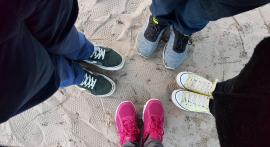Playfully promoting social learning and peer-to-peer counselling
D.O.T. research group developed analogue and digital measures to promote mental health in children and young people.
How can children in difficult life situations be supported in their personal development and in their social environment? This central question of mental health care was addressed by the international and interdisciplinary research group within the framework of the project "D.O.T. - The Open Door". At the online final conference at the Karl Landsteiner University of Health Sciences (KL) at the end of June 2022, the highlights of four years of research work were now presented.

Gute Integration in die Gruppe bzw. Schulklasse federt Belastungen ab, mildert Stress, hebt den Selbstwert und hat viele weitere positive Wirkungen auf die emotionale Entwicklung. Fehlende soziale Verbundenheit kann sich entsprechend negativ auswirken. Besonders um die Zeit des Schulwechsels kann die Beziehung zu zentralen Vertrauenspersonen verloren gehen. Es ist Anstrengung nötig, um sich in der neuen Klasse wieder gut sozial zu integrieren. Manchen Kindern fällt das leicht, andere werden zu Außenseitern oder sogar zur Zielscheibe von Mobbing. Aus diesem Grund erarbeitete die Forschungsgruppe „D.O.T. – Die offene Tür“ unter der Leitung von Beate Schrank, Psychiaterin und leitende Oberärztin am Universitätsklinikum Tulln der Karl Landsteiner Privatuniversität für Gesundheitswissenschaften (KL), in den letzten vier Jahren (2018-2021) Maßnahmen zur Förderung wichtiger sozialer Kompetenzen bei Kindern – unter anderem zur Entstigmatisierung von psychischen Erkrankungen im Schulbereich. In einem partizipativen Prozess mit Vertreter_innen aus Schulen, Patient_innenorganisationen, Kliniken, Therapie- und Beratungszentren und dem Land Niederösterreich entstanden daraus analoge ebenso wie digitale und interaktive Tools, sowie zwei große Folgeprojekte. Die Forschungsgruppe, die sich im Zuge der Open-Innovation-in-Science-Initiative der Ludwig Boltzmann Gesellschaft etabliert hat, war an der Karl Landsteiner Privatuniversität als koordinierende Institution angesiedelt. Bei einer Abschlusskonferenz Ende Juni 2022 wurden die entwickelten Maßnahmen präsentiert.
Good integration into the group or school class cushions strain, alleviates stress, raises self-esteem and has many other positive effects on emotional development. A lack of social connection can have a negative effect. Especially around the time of the change of school, the relationship to central confidants can be lost. Effort is needed to integrate well socially again in the new class. Some children find this easy, others become outsiders or even targets of bullying. For this reason, the research group "D.O.T. - The Open Door", headed by Beate Schrank, psychiatrist and senior physician at the University Hospital Tulln of the Karl Landsteiner University of Health Sciences (KL), developed measures to promote important social skills in children over the last four years (2018-2021) - among other things, to destigmatise mental illnesses in schools. In a participatory process with representatives from schools, patient organisations, clinics, therapy and counselling centres and the province of Lower Austria, analogue as well as digital and interactive tools were developed, as well as two large follow-up projects. The research group, which was established in the course of the Open Innovation in Science initiative of the Ludwig Boltzmann Society, was based at the KL as the coordinating institution. The measures developed were presented at a final conference at the end of June 2022.
The success story in figures
The total volume for the project duration was three million euros, funded by the Austrian National Foundation for Research, Technology and Development and the Federal Ministry of Science, Research and Economy. More than 1500 children and young people and seven Vienna-Extra schools were actively involved in the research work, as well as hundreds of adult stakeholders and network partners. The project successfully participated three times in the Citicen science award and was not only able to submit more than 20 papers to renowned journals, but also to deliver numerous conference contributions. In addition to many new intervention components and theoretical models, an EU follow-up project on teachers' professional well-being has already emerged.
Adventure Game "SCAN - School Can be A Nightmare
The digital single-player serious game developed serves to train interpersonal emotion regulation and strengthen social skills. In three game sequences, behaviour in a group setting and dealing with different characters is trained. The players slip into the role of a pupil who has been absent from school for a day due to illness. When he/she returns to school the next day, all the classmates and adults behave in a conspicuously unfriendly manner. Parts of the inventory are destroyed, there are no lessons and there is no explanation for all this. The players' task is to find out why everyone has changed so much and to find allies with the aim of restoring the school to its former state.
Learning programme - I & We and the little monsters
The analogue learning programme "Me & Us and the little monsters" serves to strengthen social relationships at school and was developed together with the Ministry of Education and the University of Teacher Education Lower Austria for use in school lessons.
In different modules, the teaching staff worked together with the pupils on topics such as self-efficacy, empathy, conflict resolution, bullying or social awareness. By externalising different feelings in the form of little monsters, conflict resolution strategies and examples of class rules could be worked out. The classes were also able to look at their emotion vocabulary in a new way to better channel and name feelings. The learning programme developed had a significant impact on improving friendships and well-being in the classes.
In different modules, the teachers worked together with the students on topics such as self-efficacy, empathy, conflict resolution, bullying or social awareness. By externalising different feelings in the form of little monsters, conflict resolution strategies and examples of class rules could be worked out. The classes were also able to look at their emotion vocabulary in a new way to better channel and name feelings. The learning programme developed had a significant impact on improving friendships and well-being in the classes.
Furthermore, the D.O.T. research group developed scripts, worksheets, game instructions and interactive stories with reflection exercises for teachers for eight school units (4 double units) on self-competence, class community, friendship and bullying. These can be used independently of the teacher to promote social learning and good togetherness in the classroom.
Open2Chat - online chat platform by young people for young people
The low-threshold, anonymous and free peer-to-peer offer is set up in the form of an online platform that gives young people the opportunity to talk about their problems, worries and fears with psychosocially trained peers. Under the name "Open2chat", the platform was taken over by Caritas St. Pölten at the end of 2021 and integrated into its routine counselling operations. The project continues to be scientifically accompanied and evaluated by a research team from KL and the University of Teacher Education Lower Austria. As adequate services for young people are difficult to reach, unknown or often not available at all, Open2chat counteracts an acute gap in care. The offer is explicitly not understood as a substitute for professional psychotherapy or counselling, but it opens the way and the confidence to get support.
New research centre for transitional psychiatry in Tulln
80 percent of all mental illnesses occur for the first time in adolescence. For those affected, however, there is often a gap in care, as neither the offers of child psychiatry nor those of adult psychiatry seem adequate or attractive. Transitional psychiatry focuses specifically on those affected between the ages of 15 and 25. It sees itself as a joint area of child/adolescent and adult psychiatry that offers young people a stable setting in which to cope with the developmental tasks of growing up. In the traditional care structure, these developmental tasks are often abruptly interrupted by the change between child/adolescent psychiatry and adult psychiatry at the age of 18, which has a detrimental effect on the further course of the disease. With funding from the province of Lower Austria, a separate research centre for this area is now being established at the University Hospital Tulln for the first time in Austria - with the aim of conducting specific scientific work in transitional psychiatry in a clinical context.
The two key note speakers offered an insight into the everyday clinical care of people in adolescence: Child and adolescent psychiatrist Susanne Pitnik told about the situation in the day clinic of the Department of Child and Adolescent Psychiatry and Psychotherapy at the Landesklinikum Baden-Mödling. Adult psychiatrist Josef Hinterhölzl reported on his experiences at the University Clinic for Psychiatry II in Innsbruck. The clinic is the first in Austria to offer targeted outpatient care for young people with mental illnesses in transition to adulthood.
Press contactEva-Maria GruberCommunication, PR & Marketing Karl Landsteiner University of Health Sciences Dr.-Karl-Dorrek-Strasse 30, 3500 Krems Phone: +43 (0) 2732 72090-230 Mobile: +43 (664) 505 62 11E-mail: evamaria.gruber@kl.ac.at Web: www.kl.ac.at
Contact for contentSenior Physician Priv.-Doz. Dr. Beate Schrank, MSc, PhD Head of the research group "D.O.T. - The Open Door E-mail: beate.schrank@kl.ac.at Web: www.dot.lbg.ac.at




